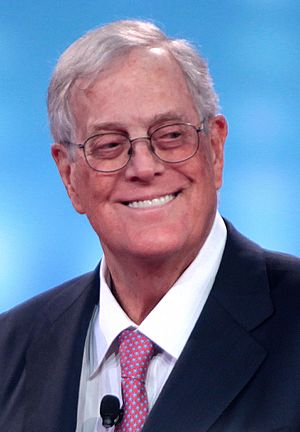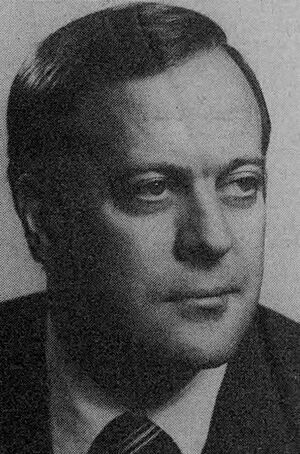David Koch facts for kids
Quick facts for kids
David Koch
|
|
|---|---|

Koch in 2015
|
|
| Born |
David Hamilton Koch
May 3, 1940 Wichita, Kansas, U.S.
|
| Died | August 23, 2019 (aged 79) Southampton, New York, U.S.
|
| Education | Massachusetts Institute of Technology (BS, MS) |
| Occupation | Vice president of Koch Industries |
| Known for | Helping cultural and medical groups Supporting small government ideas |
| Political party | Libertarian (before 1984) Republican (1984–2019) |
| Board member of | Aspen Institute, Cato Institute, Reason Foundation, Americans for Prosperity Foundation, WGBH, Massachusetts Institute of Technology, Smithsonian National Museum of Natural History, Metropolitan Museum of Art, American Ballet Theatre, Lincoln Center for the Performing Arts, Deerfield Academy, New York–Presbyterian Hospital, Memorial Sloan Kettering Cancer Center, American Museum of Natural History |
| Spouse(s) |
Julia Koch
(m. 1996) |
| Children | David Koch Jr. – David’s elder son
Mary Julia Koch – David’s daughter John Mark Koch – David’s youngest son |
| Parent(s) | Fred C. Koch Mary Robinson |
| Relatives | Frederick R. Koch (brother) Charles Koch (brother) Bill Koch (twin brother) |
David Hamilton Koch (kohk; May 3, 1940 – August 23, 2019) was an American businessman, political activist, and engineer. He was also known for giving a lot of money to good causes. In 1970, he joined his family's business, Koch Industries. This company is one of the largest privately owned businesses in the United States.
David Koch became a co-owner of Koch Industries in 1983, sharing ownership with his older brother, Charles Koch. He worked as an executive vice president until he retired in 2018 because of health problems.
Koch believed in libertarian ideas, which means he thought the government should have less control. In 1980, he ran for Vice President of the United States as a Libertarian candidate. He also gave money to groups and political campaigns, mostly those of the Republican Party.
David Koch was one of the richest people in the world. He used his wealth to support many important places. These included the Lincoln Center, Sloan Kettering, NewYork–Presbyterian Hospital, and the Dinosaur Wing at the American Museum of Natural History. The New York State Theater at Lincoln Center was even renamed the David H. Koch Theater after he donated $100 million for its renovation.
Contents
Early Life and School
David Koch was born in Wichita, Kansas, on May 3, 1940. His father, Fred C. Koch, was a chemical engineer. David was the third of four sons. He had two older brothers, Frederick and Charles Koch, and a twin brother named Bill.
He went to Deerfield Academy, a prep school in Massachusetts, and graduated in 1959. After that, he studied at the Massachusetts Institute of Technology (MIT). He earned two degrees in chemical engineering there, one in 1962 and another in 1963.
While at MIT, David Koch was a talented basketball player. He set a school record by averaging 21 points per game over three years. He also held the record for the most points in a single game (41 points) from 1962 until 2009.
His Work at Koch Industries
In 1970, David Koch started working at Koch Industries. His brother Charles Koch was already there. David began as a technical-services manager. He later opened the company's office in New York City. In 1979, he became the president of a part of the company called Koch Engineering.
In 1983, David and Charles Koch became the main owners of Koch Industries. They bought out the shares of their brothers, Frederick and Bill. David Koch owned 42 percent of Koch Industries. He worked as an executive vice president until he retired in 2018 due to health reasons.
Political Activities
David Koch was involved in politics for many years. He believed in ideas that supported less government control and more individual freedom.
Political Campaigns
In 1980, David Koch ran for Vice President of the United States. He was the candidate for the Libertarian Party, running with presidential candidate Ed Clark. Their campaign wanted to reduce the size and power of the government. They hoped to remove many government rules and agencies.
The Clark–Koch team received about 1% of all the votes nationwide. This was a good result for the Libertarian Party at that time. David Koch gave $100,000 a month to his own campaign. He said he ran because he believed in the Libertarian message.
After 1984, Koch started supporting the Republican Party more. He felt that some of the Libertarian Party's ideas were too extreme. He continued to donate money to many political campaigns, mostly Republican ones. In 2012, he spent over $100 million to try and stop President Barack Obama from being re-elected.
His Beliefs
David Koch supported policies that aimed for a smaller government and lower taxes. He was against some major government laws, like the Patient Protection and Affordable Care Act.
He also had strong views on other topics. For example, he questioned if global warming was mainly caused by humans. He thought a warmer planet might even have some benefits, like longer growing seasons. Koch also opposed the Iraq War, saying it cost too much money and lives.
He considered himself a social liberal. This means he supported things like women's right to choose, gay rights, and same-sex marriage. He also opposed the war on drugs.
Supporting Groups
Koch gave money to many groups that promoted his political ideas. In 1984, he started a group called Citizens for a Sound Economy. He was the chairman of its board. He also helped start and fund Americans for Prosperity, another group that supports similar ideas.
He was on the board of the Cato Institute and Reason Foundation. These are groups that promote libertarian ideas. David and Charles Koch were known for supporting free market ideas. Time magazine included them in its "Time 100" list several times because of their influence in politics.
Helping with Prison Reform
In 2015, David and Charles Koch were praised for their work on prison reform in the United States. They worked with groups like the ACLU to make the prison system better. They wanted to help people who had been in prison find jobs and reduce the number of people who return to prison. They believed the system unfairly affected people with low incomes and minorities.
Giving Back: Philanthropy
David Koch gave more than $1 billion to many different causes. He was listed as one of the world's top philanthropists (people who give money to good causes).
Arts and Culture
In 2008, Koch promised $100 million to fix up the New York State Theater at the Lincoln Center for the Performing Arts. This theater is home to the New York City Ballet. Because of his generous gift, the theater was renamed the David H. Koch Theater. He also gave $10 million to renovate the fountains outside the Metropolitan Museum of Art.
Koch was a trustee for the American Ballet Theatre for 25 years. He gave over $6 million to this ballet company. He also supported WGBH-TV, a public television station.
Education
From 1982 to 2013, David Koch gave $18.6 million to the WGBH Educational Foundation. This included $10 million for the Public Broadcasting Service show Nova.
He also gave a lot of money to the Smithsonian Institution in Washington, D.C. He gave $20 million to the American Museum of Natural History to create the David H. Koch Dinosaur Wing. He also gave $15 million to the National Museum of Natural History to create the David H. Koch Hall of Human Origins.
Koch also helped his old school, Deerfield Academy. The school's swimming pool, science center, and field house are named after him.
Medical Research
David Koch said his biggest donations were for finding a cure for cancer. Between 1998 and 2012, he gave at least $395 million to medical research.
He was on the Board of Trustees for NewYork–Presbyterian Hospital. In 2013, he gave $100 million to this hospital. This was the largest donation in its history at the time.
Koch also supported the Prostate Cancer Foundation. He gave $41 million to this foundation. He also gave $20 million to Johns Hopkins University for cancer research. The building he helped fund there is called the David H. Koch Cancer Research Building.
In 2007, he gave $100 million to the Massachusetts Institute of Technology (MIT). This money helped build a new research center called the David H. Koch Institute for Integrative Cancer Research. He also gave $30 million to the Memorial Sloan Kettering Cancer Center in New York City.
In 2015, he promised $150 million more to the Memorial Sloan Kettering Cancer Center. This money will help build a new center for cancer care.
His Wealth
David Koch was a very wealthy man. In 2012, he was the fourth-richest person in the United States. In 2013, he was the richest person living in New York City. By June 2019, he was ranked as the 11th-richest person in the world. He shared this rank with his brother Charles, and their fortune was about $50.5 billion.
Personal Life
In 1991, David Koch was a passenger on a plane that crashed at Los Angeles International Airport. Thirty-five people died, but Koch survived. He said this event changed his life and made him want to give more to charity.
In 1992, he was diagnosed with prostate cancer. He had treatments, but the cancer kept coming back. Koch believed his experience with cancer encouraged him to fund medical research.
In 1996, he married Julia Flesher. They had three children together.
Death
David Koch passed away at his home in Southampton, New York, on August 23, 2019. He was 79 years old. After his death, his wife, Julia Koch, and their three children inherited his share of Koch Industries.
See also
 In Spanish: David Koch para niños
In Spanish: David Koch para niños
- Koch family
 | Delilah Pierce |
 | Gordon Parks |
 | Augusta Savage |
 | Charles Ethan Porter |


